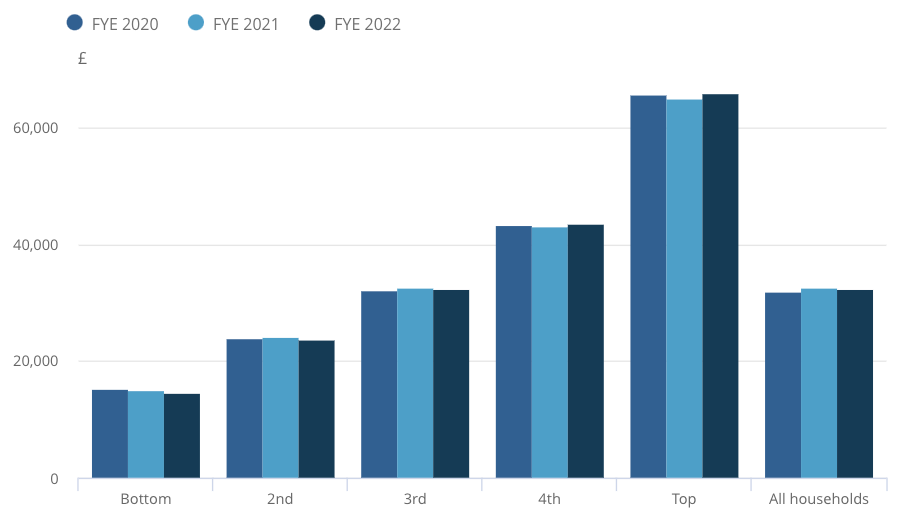UK’s wealth gap: Cost of living crisis boosts income of richest Brits by £1k but leaves poorest £600 a year worse off

The disparity between Britain’s richest and Britain’s poorest earners has grown as a result of the cost of living crisis and a freezing in the income tax threshold, figures have revealed.
The richest Brits have managed to increase their household disposable income by just over £1,000 in the last year, while the poorest are on average £600 worse off, according to the Office for National Statistics (ONS)
Disposable income among the poorest fifth of UK households tumbled nearly four per cent over the last year to £14,500, according to the Office for National Statistics (ONS).
Meanwhile, the wealthiest fifth have trousered a 1.6 per cent increase in their pay, with the average salary of those in the top bracket coming in at £66,000 a year.
The figures illustrate how the cost of living crisis has disproportionately impacted the least well off in Britain, with the richest now more than £51,000 wealthier than the poorest.
A reduction in benefits last year cut incomes at the lower end of the distribution by nearly two per cent.
Income tax freezes and other hikes also caught the poorest, ratcheting up the blow from cutting state payouts.
Businesses have also cut wages for the least well paid staff while handing up bumper rises to the top earners.
“Wages and salaries increased by 3.2 per cent across all households, however, the poorest fifth of people saw a 7.5 per cent decrease, while the richest fifth saw a 7.8 per cent increase,” the ONS said.
UK household income distribution

Laura Suter, head of personal finance at broker AJ Bell, said: “The poorest fifth of the UK was hit by two factors: their wages failing to keep up with inflation and benefits falling in real terms, both of which had a dramatic impact on their spare cash.”
Over the course of Covid-19 crisis, then chancellor and now prime minister Rishi Sunak stepped up weekly benefit payments by £20. However, he ditched the upgrade in October 2021, taking money away from the poorest.
Normally policymakers would offset a reduction in state handouts with tax reductions aimed at the poorest, however the ONS’s figures show this did not happen last year.
Less wealthy Brits are also bearing a heavier burden from the cost of living crisis. Higher food and energy bills have fuelled the squeeze, areas of spending the poorest have less capacity to cut back on compared to the richest.
“Conversely, richer households have far more ability to cut back on their spending as more of it goes on non-essentials, such as holidays and luxury items,” Suter added.
The yawning gap between rich and poor is stretching inequality in the UK. The country’s gini coefficient – a measure of differences in the income distribution – grew 1.3 percentage points to 35.7 per cent.
Median household disposable income dropped nearly one per cent over the last year to £32,300, the ONS said.